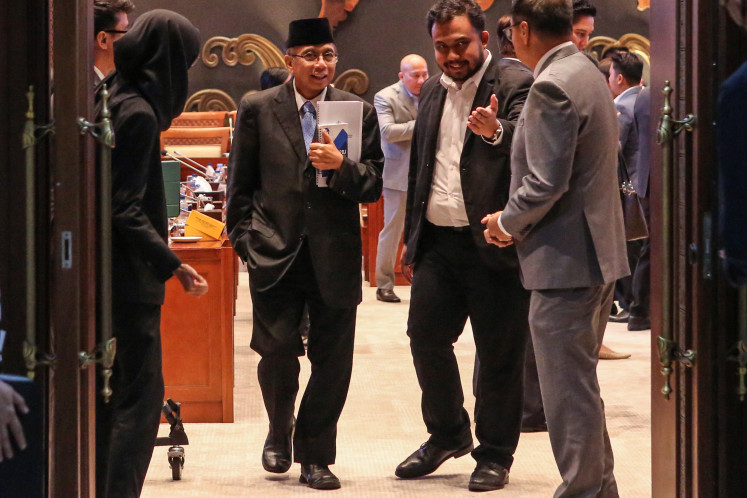Popular Reads
Top Results
Can't find what you're looking for?
View all search resultsPopular Reads
Top Results
Can't find what you're looking for?
View all search resultsThe coffee king of Tampak Siring
Cleaning coffee:: These freshly roasted beans are sifted to remove debris
Change text size
Gift Premium Articles
to Anyone
Cleaning coffee:: These freshly roasted beans are sifted to remove debris.
While baristas froth their coffees with signature swirls and take orders for mocha frappe lattes with light soy from hip customers, one village coffee producer sticks to serving coffee sweet, straight black.
From a soot-shadowed shed in the back garden of their Tampak Siring home, Ni Nyoman Mukti and her husband Wayan Rati Rutama roast and grind local coffee beans as they have done for the past 44 years.
The ashy aroma of fired beans permeates the atmosphere, which is dense with a fine chocolate colored dust. As Nyoman squats to stir the freshly roasted piles of beans, smoke rises into the dim workspace like fog off a winter sea.
Little has altered here in the process of coffee bean curing over the decades, apart from the relatively recent introduction of a motorized flywheel to turn the drum of fresh beans spitted over a fire and a diesel- powered grinder that sets up a racket to wake the dead each afternoon.
These machines have been a great boon to Nyoman; in the recent past this 59-year-old woman tended the fire and turned by hand the roasting drum, hour after exhausting hour.
Hot work:: Coffee curer Ni Nyoman Mukti tends the fire as the beans roast over the flames.
'Before we had the machines I had to roast the beans by hand. That was really hot and heavy work, turning the barrel with a handle and stoking the fire. I would begin early in the morning and finish in the afternoon. Then I would grind the beans in the stone mortar,' says this tiny woman worn thin from the rigor of her work.
'Life was much nicer once we got the machines ' I am not so tired and hot and I can do other jobs while the coffee roasts.'
Nyoman and Wayan's customer base has been built year-by-year through word of mouth. There are no signs to guide buyers through their front gate, yet customers keep on coming from districts near and far, such as 55-year-old Ibu Gusti and her daughter, also named Gusti.
The couple have arrived carrying kilos of ripe coffee beans to be processed by Nyoman and Wayan in the coming days.
'We buy our fresh beans from the Tampak Siring market and then bring them here to be roasted and ground. We have done this for years because the coffee is delicious and natural, it is organic coffee,' says Ibu Gusti of the beans she says are grown in Bali's temperate mountain zones.
'These are Balinese coffee beans. They may not have originated here, but these coffee trees have been growing here so long we feel it is Balinese,' says Gusti the younger, adding the 7 kilos of fresh beans, after roasting and being ground into powdered coffee, will be shared with friends and relatives during a ceremonial cremation in early August.
Stream of beans:: Rich fresh coffee ready for grinding.
'We have this coffee for all our ceremonies. We need a lot of coffee for our guests and helpers at the funeral,' says Ibu Gusti.
Head of the coffee-producing family, Wayan Rati, 59 years old like his wife, began his career in coffee at just 15 years of age, when he would walk from warung to warung throughout Tampak Siring selling the coffee his mother cured.
'I was still a youth when I started selling coffee. Just here in Tampak Siring, that was around 1970. My parents liked coffee and drank it every morning ' all farmers need coffee in the mornings, and my mom also roasted coffee and sold it, so that's how I started,' says Wayan, adding that his wife, who at the time lived a few doors down, also came from a coffee producing family.
Teamwork:: Nyoman (left) and her husband Wayan have been producing coffee by hand for the local market for more than four decades.
In the early days of their family business, Nyoman and Wayan processed no more than 15 kg of beans a day, but over the decades their reputation for curing fine quality coffee by hand has grown substantially.
'We are still a small business, and until recently we were grinding coffee on a stone pestle. These days we make about 75 kg of coffee each day and people come from far away, bringing their beans for us to process. My mom always said we didn't need a sign to advertise our coffee. She said leave the sign, when people hear about your coffee they will come,' says Wayan.
Ironically, neither Wayan nor Nyoman are coffee drinkers.
'When I was younger I enjoyed coffee, but since 1976, no coffee. I stropped drinking coffee when I heard it's better for your health not to have coffee. My wife gave up coffee at the same time as I did. It's funny, I don't like to drink coffee, I just like to make it,' laughs Wayan, who has no dreams of building a coffee empire and who would be dazzled by the sight of a barista behind a coffee bar.
'I never think about competition in the coffee market. We just make our coffee for our local market and that is enough for us,' says Wayan, whose rich and bitter coffee retains the smoky essence of being roasted over a wood fire. This is no frills coffee best served black and basic.
' Photos by J.B.Djwan













